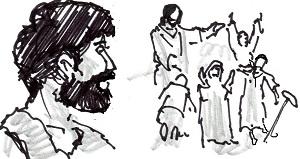
“John was a burning and shining lamp...” (John 5:34).
The Christmas story is so familiar to us that we rarely stop to note how much misdirection and confusion it holds. John the Baptist sets the stage for the coming of Jesus but gets it all wrong. He is like a stage manager who shines a spotlight on the curtain where the actor is supposed to appear, while the star of the show slips onto the stage from the audience unrecognized.
John’s role is critical to the Gospel writers because he represents continuity with the prophecies and promises contained in the Law and the Prophets. His fierce preaching and dire warnings that God was coming into the world to pass judgment set the stage for a particular kind of Messiah, one wielding an ax to the root of the tree, one striding onto the threshing floor with the winnowing fan to separate the wheat from the chaff.
Jesus was neither of these. Even after baptizing Jesus at the Jordan, John will end his career wondering if he had pointed to the right man. Sitting in Herod’s dungeon, John has to send messengers to ask Jesus if he was the one, or should they be looking for another.
The four evangelists had to straighten out the confusion to connect Jesus to the Baptist. Matthew does it by asserting that Jesus was God’s “messianic secret,” a surprise candidate who would reverse the Baptist’s image of a stern judge to introduce Jesus instead as the Suffering Servant who came preaching mercy and forgiveness.
The fourth Gospel adds more themes to the story. After baptizing Jesus, the Baptist will point him out to his own disciples as “the Lamb of God,” a sacrificial offering for the sins of the world. Jesus is also depicted as a bridegroom, or as the ladder of Jacob connecting heaven and earth.
Some of the Church Fathers, reflecting on the mystery a century later, affirm that the way Jesus slips into the world unknown was to remain hidden from Satan until he reached maturity and began his public ministry. The temptation stories suggest that Satan needed to probe Jesus in the desert to discover God’s sleight of hand in sending the divine Son in the form a Galilean carpenter.
The Christmas story turns out to be a mystery story, marked by twists and turns, tension and drama. Think of Herod’s soldiers arriving to slaughter babies on the heels of Joseph’s flight to the border with Jesus and Mary, their long exile in Egypt and the anonymity of Jesus in Nazareth for 30 years. The evangelists hint at the other narrative of fulfillment hidden in the Scriptures, in which the Christ does not condemn the world, but suffers and dies to save it.
Pope Francis has often set out to shake the familiar story that puts so many Christians to sleep in their faith, believing they already know how God operates, what to expect, how to always be ready. The pope has set aside the theology books, the continuity of tradition, the standard moral measure for every situation, and has invited us to meet the God of surprises. He has preached often that experience is better than concepts, encounter is more risky but more fruitful than formulas and the patterns we control. Something new is happening.
There are other evangelists among us. Children teach us to anticipate the unknown, to wonder what will happen, to imagine until it stretches our hearts and minds to the limits. They tell us to be open to the possibility that Christmas is about to come to us for the first time, brand new, full of mystery, shockingly so, an encounter with God we could not have planned, but one that will change us and everything we thought we knew for certain.
Isn't this the Christmas we really want, the Christmas we should pray for and prepare for?





